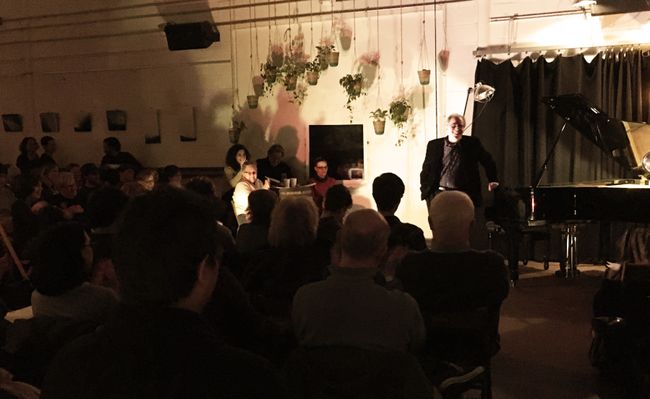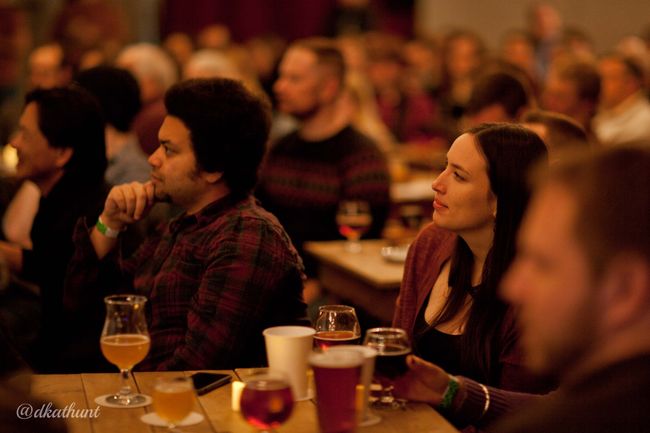Musicology PhD student taps in to new audiences with Aeronaut Brewery’s new performance series.
Spark Volume 3, Issue 3 | by Emily White

An audience gathers, pints in hand, as Joshua Rifkin explains the evening’s repertoire of rags, tangos, and waltzes.
Tucked away inside a hidden warehouse in Somerville one stumbles upon local gem Aeronaut Brewing Company, and on the occasional Sunday evening, a remarkable assortment of live music. Home-grown musicians give patrons a taste of everything from Bach to fiddles to tangos on piano, thanks to the passion of CFA’s Jason McCool.
McCool, a PhD candidate in Historical Musicology, loves thinking about innovative ways to discover the beauty of art, both classic and new. He learned sometimes that music is best served with a fresh local brew.
Much of the music McCool grew up listening to and studying, while groundbreaking and awe-inspiring, he saw as deserving of a new, wider audience. According to McCool, the pindrop sessions program at Aeronaut was born out of a desire to present some of the many inspiring musicians in the Greater Boston area in a casual setting, at an affordable price, and of course paired with delicious beer. “I like to call our programming ‘classical-ish,’” says McCool.
Since its launch in 2014, Aeronaut has established itself as a leader in community-driven events, many of which incorporate Boston-area artists. McCool became the brewery’s Arts & Culture Liaison two years ago, and in the spirit of elevating Boston’s identity as a hub of innovative artists and creative minds, established relationships with local artists and organizations to expand the programming. The pindrop sessions are presented in partnership with Boston public broadcaster WGBH and 99.5 WCRB, Classical Radio Boston.
All Genres on Tap
Local artists. High-quality performances. Unique repertoire. The first season of pindrop sessions has curated eight events with distinctive creative experiences. “Every event uses the space differently,” according to McCool, “and while one event might feature a Beethoven symphony performed by a full orchestra, another might showcase a folk singer, and another a cabaret with Broadway-style performers. I’m quite sure there is literally at least one concert for everyone in our first season.”
McCool, a lover of Boston, says many factors brought him to BU, “but above all else, two rare qualities: the astounding excellence, intellectual rigor, and accomplishments of the faculty; and their rare, inspiring openness to new ways of thinking about music and the arts.” Through his work he explores public musicology and scholarship, and along with the faculty and his fellow School of Music students, he seeks to critically engage with the issues of the day and use his skill and passion to advocate for the arts.
This innovative program incorporates the collaborative spirit of CFA’s faculty and students and presents the ultimate community music experience. McCool believes that sharing remarkable music that most of the audience has no t experienced live—“whether that be a knotty Stravinsky piece for orchestra, an Irish air played on the fiddle, a heartbreaking cabaret song about 9/11, a raucous country romp, or an acoustic guitarist playing transcriptions of Back cello suites”—is both affirming and transformative.

Photo by Diana Hunt
McCool has poured a lot of passion into this initiative, and sees the importance in breaking down barriers between artists and their audiences, in so doing exposing new audiences to music they might otherwise never have had the chance to encounter. Joshua Rifkin, CFA Professor of Music, Musicology and Ethnomusicology, agrees. Like many of his contemporaries with many years of concert experience, Rifkin recognizes “the limitations of standard presentations of classical music in particular…We need to break the mold, find something more mutually rewarding.”
In February, Rifkin brought ragtime and tango to the brewery. The concert was “devoted to piano music by the essential American composer Scott Joplin and his great Brazilian counterpart Ernesto Nazareth… it’s wonderful music, north and south. As I say, I love this music, and have done for ages: for its elegance, its exuberance, its deep soul.”
According to his advisor Victor Coelho, McCool has latched on to this indie form of promoting classical music. “Traditional institutions and conservatories are facing a challenge finding new generations of audiences,” says Coelho. Events like pindrop tackle the question of how orchestras can evolve and craft sustainable programming. “Jason brought Beethoven’s 5th to the brewery,” remarks Coelho. “This is a really innovative program. He understands that the time is right to move the format and spaces of this program; expanding and reimagining the experience to reach out to new audiences.”
Coelho, chair of the Musicology and Ethnomusicology department in the School of Music, explores the intersections of music in politics, culture, and history, from the Renaissance to Hamilton. There are no barriers between study of performance and music history. According to Coelho and his colleagues, Musicology is a forward-looking department, and the public reach of programs like pindrop sessions, started by students and alumni, have expanded outreach to audiences in the Boston area.
Students of musicology at BU, an inherently interdisciplinary program, have the chance to collaborate with departments across the university, from African American Studies and Anthropology to Engineering and Physics. “Students are listening to Kendrick Lamar and studying the Middle Ages, so it’s easy to see how perspectives can change and shift,” says Coelho.
Musicology and students like Jason McCool are cultivating in peers and in the community a sense of discovery about music past and present. According to Coelho, “the greatest moment is when the light goes on…and that’s what Jason is doing with this program.”
“In a sense,” reflects McCool, “the music always moves where it wants to move, and if we’re lucky, we get to drive the ship for a short time. Human beings will always crave peak experiences and community, and exposing ourselves to great music” is a part of that. Musical experiences like these “take us out of our mundane lives for a few moments… We need music because we need transcendence, and we should always recall, regardless of our age, the transformative power of allowing beautiful things to seep into and shape the contours of our lives.”
Sometimes, those moments of beauty come in the least expected places.